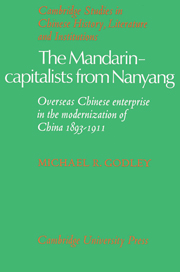 The Mandarin-Capitalists from Nanyang
The Mandarin-Capitalists from Nanyang Book contents
Epilogue: Old faces in a new government
Published online by Cambridge University Press: 23 September 2009
Summary
Chang Yü-nan died in the fall of 1911 before he had a chance to begin his own great mission to Nanyang. By then, however, the end of the dynasty was so close at hand that the Ch'ing rulers would not again have an opportunity to exploit the foresight and wealth of overseas Chinese. The mandarin–capitalists from Southeast Asia together with the special representatives sent out by Peking had done much to help transform China's attitude toward those abroad. To the degree that they were successful, they set a pattern which was repeated in the early years of the Republic.
Before the new regime was more than a few months old, it had already dispatched its first special agent to pacify the overseas Chinese in Southeast Asia and to investigate the leanings of the commercial community. After all, the most successful elements had been slow to support Sun Yat-sen's revolution. Hu Han-min, a close associate of Sun, once lamented that ‘the big capitalists were against revolution, were afraid of revolution’. Loke Yew, often asked to contribute to the movement, would always respond: ‘If you are sure you can succeed, then I will help you.’ And then there was Oei Tiong Ham, surely the most influential man living in the Netherlands Indies, who knew all about the revolutionary cause and, according to Hu, dared not openly disapprove but who was also very reluctant to part with any money.
- Type
- Chapter
- Information
- The Mandarin-Capitalists from NanyangOverseas Chinese Enterprise in the Modernisation of China 1893–1911, pp. 184 - 189Publisher: Cambridge University PressPrint publication year: 1981


